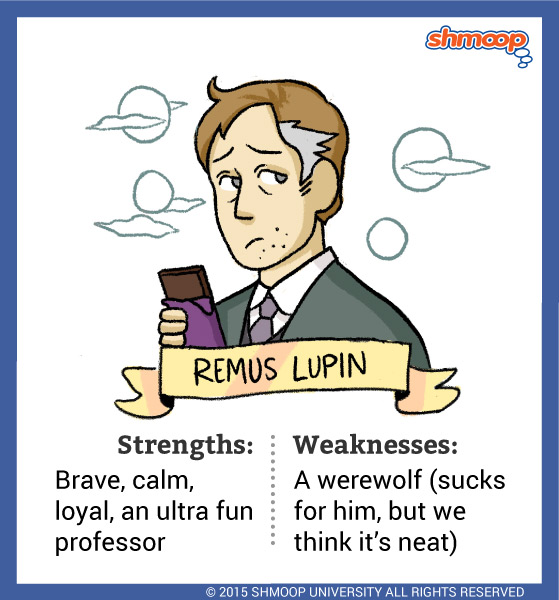Character Analysis

(Click the character infographic to download.)
Professor: Defense Against the Dark Arts
If Snape is like a student's worst nightmare, then Lupin is a dream come true. He's young, he's cool, he's actually a good teacher, he seems to have a never-ending supply of chocolate on hand, he'll teach you to fight Dementors, and he's also werewolf. Best new character ever, basically.
One Cool Dude
Lupin really takes on the role of Harry's mentor in this book, and he does a bang-up job. His various conversations with Harry after their Patronus charm training sessions are some of the most important in the entire book in terms of themes and issues, where debates range from the morality of capital punishment (i.e., the Dementor's Kiss), the nature of evil (i.e., Dementors), and that dastardly Sirius Black.
…With A Few Issues
But Lupin isn't just some sort of Stand and Deliver-type of teacher who reaches out to kids and delivers inspirational spiels, while still maintaining an air of coolness – he's actually a very complex character with a dark past. The poor guy is kind of like the forgotten Marauder in a lot of ways. For years he thought that two of his dearest friends were dead (Peter and James) and another went all evil-psycho (Sirius). And at the end he's basically exiled from Hogwarts, alone, after Snape conveniently lets everyone know that Lupin is a werewolf (which is something that's feared and even hated in the wizarding world, if Ron's extreme reaction is any indication).
Lupin has led a hard life and is a very sympathetic figure, but that's still not the reason we like him. We like Lupin because he's very real – he makes mistakes and he has flaws, but he also learns from them.
"I sometimes felt guilty about betraying Dumbledore's trust, of course [...] he had no idea I was breaking the rules he had set down for my own and others' safety. [..] But I always managed to forget my guilty feelings every time sat down to plan our next month's adventure. And I haven't changed [...]"
Lupin's face hardened, and there was self-disgust in his voice. (18.52)
Lupin is old and wise enough (old beyond his years in a lot of ways due to all the stress he's had to endure) to give Harry good advice, based on his own experience and regrets. But he still makes mistakes, like not contacting Dumbledore earlier out of fear.
Setting the Tone
To top it all off, we have to say that Lupin has a great sense of humor. In a way, he largely sets the tone for the entire novel. Lupin has the sort of dry, deadpan delivery and mild humor that the narrator has:
"Well, hello, Peter," said Lupin pleasantly, as though rats frequently erupted into old school friends around him, "Long time no see." (19.85)
Lupin's delivery is most frequently described as "light" or "pleasant" in the book; he always speaks "lightly" or "calmly." And, in that respect, he very much echoes the narrator's tone, which is generally quite light and easy. This, coupled with Lupin's tendency to helpfully spout off thematic points for us, makes him a sort of stand-in narrator in places.